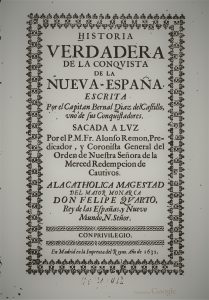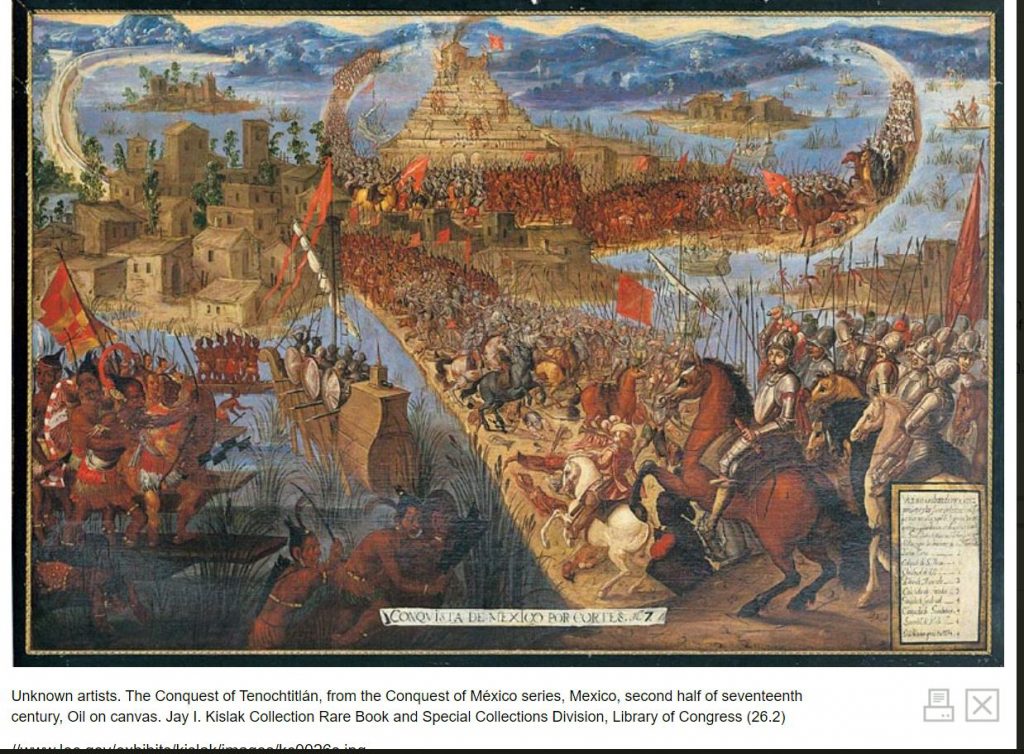Latin American Studies Collections
UCB Library Event: Undaunted Archivists and Curators from the American South Speak!
Undaunted Archivists and Curators from the American South Speak!
Date: Tuesday, June 1, 2021
9:30-11 a.m. PDT
12:30-2 p.m. EDT,
10:30 a.m.-12 p.m. MDT,
11:30 a.m.-1 p.m. CDT
The registration link is below. The event is free, and all are invited to attend.
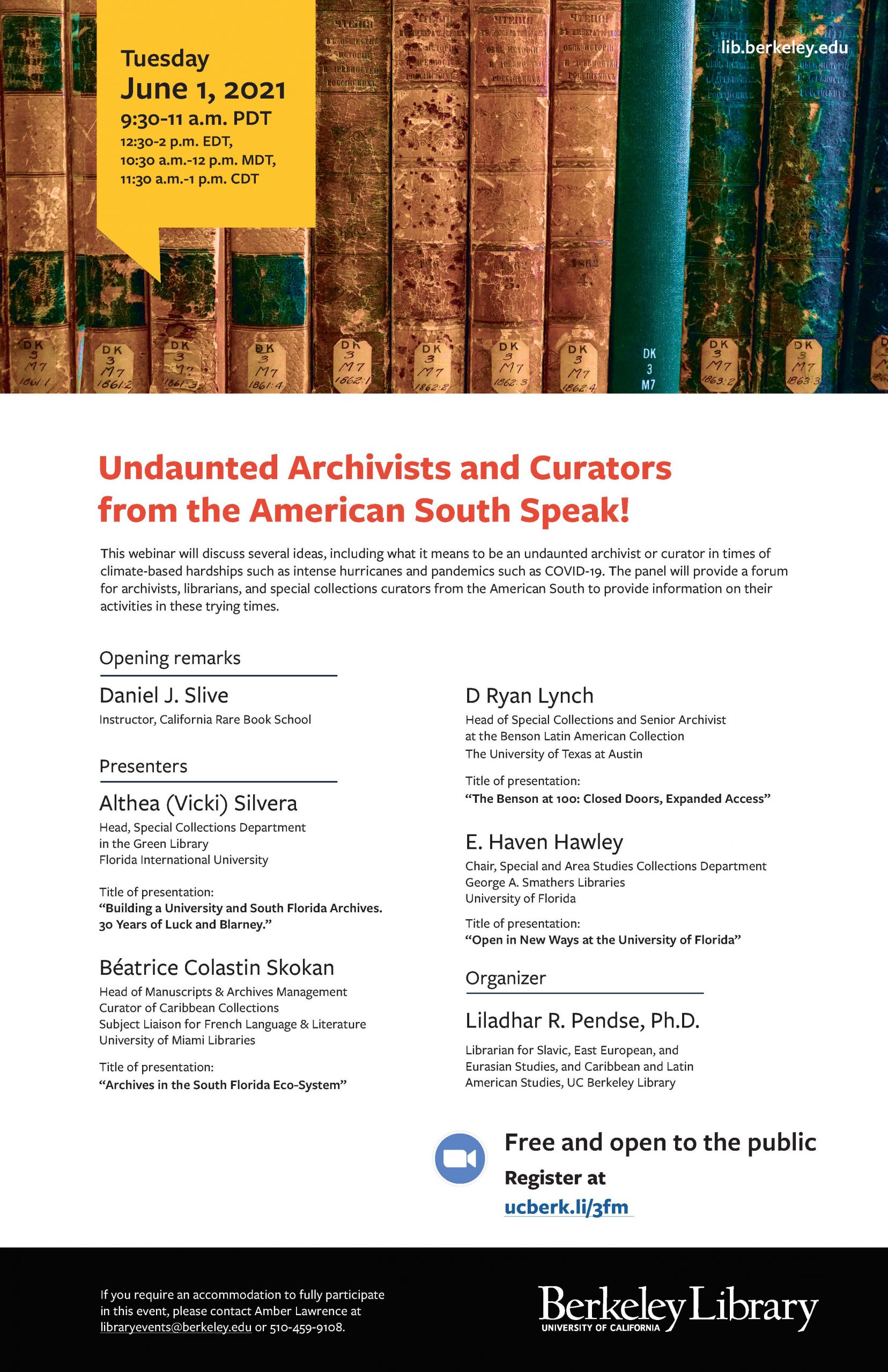
CRL Webinar-Radical Collaboration: Library Publisher Partnerships to Advance the Global Knowledge Commons
The CRL Webinar are available at the end of this post.
The Global Press Archive Charter Alliance is an initiative by East View Information Services and the Center for Research Libraries to develop a unique series of thematically designed collections to meet the priorities of the CRL members. 74 CRL (including UCB) and NERL libraries have committed $4.25 million to help launch the first three years of the project.
So far, we have access to Mexican Revolutionary Newspapers and Russian Imperial Newspapers as a part of this process.
Independent and Revolutionary Mexican Newspapers
The Independent and Revolutionary Mexican Newspapers collection, with a preliminary release of 135,000 pages from 477 titles, will ultimately include approximately 1,000 titles from Mexico’s pre-independence, independence, and revolutionary periods (1807-1929).
The Imperial Russian Newspapers collection comprises out-of-copyright newspapers spanning the eighteenth, nineteenth, and early twentieth centuries, up to the 1917 Bolshevik Revolution. [1782-1918]
Webinar Recording is below:
Mexico and the conquest of Tenochtitlán (May 1521-2021)
The month of May this year marks the five-hundredth anniversary of the fall of Tenochtitlán (1521-2021). The tragedies that unfolded in the continent after the conquest are well documented. However, as far as the accounts of the fall of the Tenochtitlán are concerned, there are several different opinions and disagreements. What about the letters of Hernán Cortés? Here is the second letter from the WDL
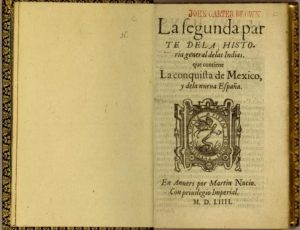 Also on the archive.org, we see a digitized copy of JCB’s 1552 Francisco López de Gómara’s “La historia general de las Indias, y todo lo acaescido enellas dende que se ganaron hasta agora. ; y La conquista de Mexico, y dela Nueua España.”
Also on the archive.org, we see a digitized copy of JCB’s 1552 Francisco López de Gómara’s “La historia general de las Indias, y todo lo acaescido enellas dende que se ganaron hasta agora. ; y La conquista de Mexico, y dela Nueua España.”
What are some of the primary sources that are now open access and can be used to inform us about the events that unfolded five hundred years ago? One such source is Bernal Díaz del Castillo’s is work, “Historia verdadera de la conquista de la Nueva España.” On the right, one sees a title page of the 1632 imprint of the same that is available in Google Books.
While some often use paintings from the late 17th century to depict and describe the fall of the capital of the Aztecs, these are often functions of the artistic license, and in some cases, we do not know who could have painted them.
The painting, such as the one below, is one example from the Library of Congress’ collection. Can images narrate the nuanced past accurately? These images are from the LOC’s exhibition and also in Wikimedia commons.
But where are the voices of those who were conquered but not vanquished? Can we rely on Codex Florentino as one perhaps contested source? The WDL (from the collection of Biblioteca Medicea-Laurenziana) has made it available for the readers to judge the process that began with the conquest of Tenochtitlán. The LOC’s description reads, “Historia General de las Cosas de Nueva España” (General History of the Things of New Spain), as the Florentine Codex is formally known, is an encyclopedic work about the people and culture of central Mexico compiled over a period of 30 years by Fray Bernardino de Sahagún (1499–1590), a Franciscan missionary who arrived in Mexico in 1529, eight years after completion of the Spanish conquest by Hernan Cortés. The text is in Spanish and Nahuatl, the language of the Aztecs. Its 12 books, richly illustrated by indigenous artists, cover the Aztec religion and calendar, economic and social life, Aztec history and mythology, the use of plants and animals and the Spanish conquest as seen through the eyes of the native Mexicans.”
I leave you with unfinished thoughts. Can a manuscript tell the story? See for yourself by watching Getty Researcher Institute’s five-part series. And with Taibo’s, “¿Historia para qué?”I love Paco Ignacio Taibo II’s argument about who we are? And his questioning of sanitization history where Cortes and Cuauhtemōc are dancing La Sandunga.
Call for Proposals: LAUC-B 2021 Conference Oct 5-6 2021 – Reimagining Libraries Through Critical Library Practices, October 5-6, 2021- Call for Proposals Due June 15, 2021

The Librarian’s Association of the University of California, Berkeley (LAUC-B) invites you to submit a proposal for the 2021 conference, Reimagining Libraries Through Critical Library Practices, an online conference that will take place Tuesday, October 5 to Wednesday, October 6, 10 am to 3 pm PST.
Proposals are due Tuesday, June 15, 2021, and can be submitted using this form. We will notify successful applicants by July 15, 2021.
For further conference information and the full call for proposals, please visit LAUC-B 2021 Conference Website
Call for proposals brief version: Library work is embedded in and inherently tied to socio-political circumstances. We welcome proposals that emphasize and examine critical librarianship through the lens of social justice, diversity, equity, inclusion, and anti-racist work.
We invite proposals from diverse voices addressing critical library practices including:
- Community Archives, Inclusion, and Underrepresented Communities
- Critical Library Pedagogy
- Developing standards for critical librarianship in Digital Literacy and Digital Scholarship
- Diversity, Equity, and Inclusion
- Open Access
- Social Justice and Anti-racist Work
- The theory and practice of critical library work that includes all library professionals
All proposal abstracts should be no more than 300 words and indicate the type of session you are proposing. We will be holding the following session formats:
- Lightning Talks (5-7 minute presentations)
- 20-minute individual presentations
- 50-minute panel
- Poster session
We encourage proposals for virtual presentations that represent all aspects of library work (including technical services, access services, interlibrary loan, reference, instruction, library administration, technology, youth services, and more) and all library workers (including library students, paraprofessionals, and members of underrepresented groups).
For further conference information, please visit here.
Please submit your proposal by Tuesday, June 15, 2021. Successful applicants will be notified by Thursday, July 15, 2021.
If you have any questions, please contact us through the website or at laucbconfinfo@lists.berkeley.edu
Sincerely,
LAUC-B 2021 Conference Committee:
Paromita B. (UCLA)
Kelsey B. (UCI)
Kristina B. (UCB)
Lia F. (UCSD)
Ann G. (UCB)
Shannon K. (UCB)
Corliss L. (UCB)
Natalie M. (UCI)
Jin M. (UCSD)
Erica N. (UCB)
Liladhar P. (UCB)
Scott P (UCB)
Christina V. (UCB)
Julián Herbert – La Casa del Dolor Ajeno
On May 16th, the Guardian newspaper reported the tragic events in Torreón, Mexico, during the Mexican Revolution under the headline. The headline read: Mexico faces up to the uneasy anniversary of Chinese massacre.
As the librarian, I look mostly for Latin American Studies-related materials without any judgment about the contents and collect for our library a representative and sustainable collection of all aspects of Latin America that are diverse and neverending. After reading the headline, it reminded me of my research on Chinese in Mexicali during my graduate school. Today, I leave you with some library materials that relate to Chinese in Mexico and Latin America.
The house of the pain of others: a chronicle of a small genocide / Julián Herbert; translated from the Spanish by Christina MacSweeney (Minneapolis, Minnesota: Graywolf Press, [2019]). The publisher’s description in WorldCat states, “Early in the twentieth century, amid the myths of progress and modernity that underpinned Mexico’s ruling party, some three hundred Chinese immigrants–close to half of the Cantonese residents of the newly founded city of Torreón–were massacred over the course of three days. It is considered the largest slaughter of Chinese people in the history of the Americas, but more than a century later, the facts continue to be elusive, mistaken, and repressed. ‘And what do you know about the Chinese people who were killed here?’ Julián Herbert asks anyone who will listen. An exorcism of persistent and discomfiting ghosts, ‘The House of the Pain of Others’ attempts a reckoning with the 1911 massacre. Looping, digressive, and cinematic, Herbert blends reportage, personal reflection, essay, and academic research to portray the historical context as well as the lives of the perpetrators and victims of the ‘small genocide.’ This brilliant historical excavation echoes profoundly in an age redolent with violence and xenophobia”–Page 4 of cover.”
Here is the presentation by the Author for your information.
https://youtu.be/3efedXvJYnw
On one-hundredth anniversary of the Chinese Massacre of Mexico, Mexican President Andrés Manuel López Obrador(AMLO) held a ceremony whose title was, “Petición de perdón por agravios a la comunidad china en México, desde Torreón, Coahuila. Lunes 17 de mayo 2021.” Below is an excerpt from his speech.
Come Celebrate Asian-American and Pacific Islander Heritage Month, May 11, 2021 @UC Berkeley Library
May is Asian American and Pacific Islander (AAPI) Heritage
Month, dedicated to celebrating the Asian American and Pacific Islander communities in the United States. During this 90-minute webinar, speakers will discuss historical and contemporary issues affecting the AAPI community. In light of the recent attacks on the Asian American community, this event takes on particular importance.
The event is free and open to all with prior registration: http://ucberk.li/aapihm-event
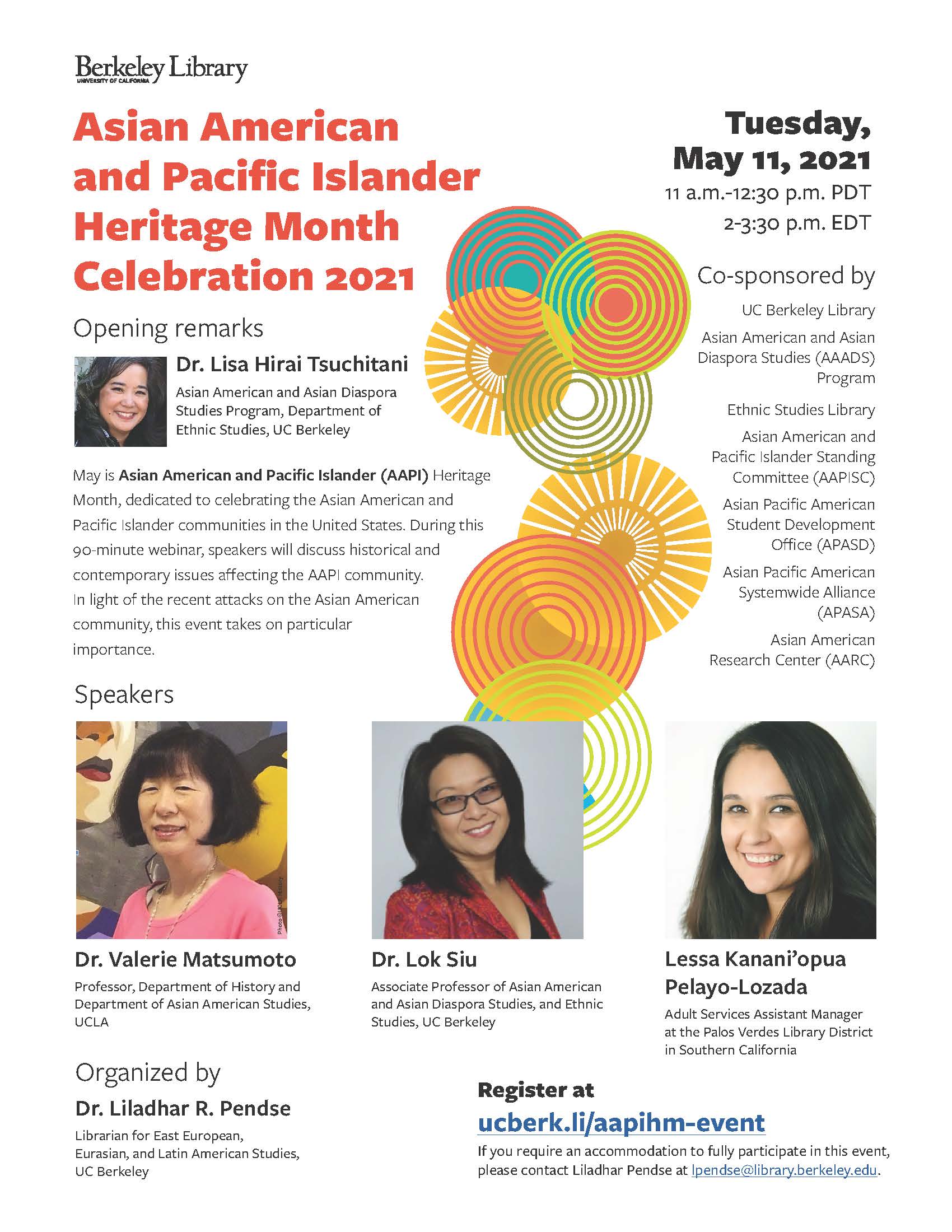
LA PROTESTA (Argentina) Digitized along OA model
In a 2012 issue of European Review of Latin American and Caribbean Studies / Revista Europea de
Estudios Latinoamericanos y del Caribe, No. 92 (April 2012), we see the descriptions of La Protesta- Argentina’s important historical anarchist newspaper as follows, “The Argentinean newspaper La Protesta was founded in 1897. After some years, it became the most important anarchistic newspaper in the country. It had close ties with the Regional Workers Federation (FORA) that was established in 1901. The history of La Protesta gives a good overview on the themes concerning the Latin American realities in the first decades of the twentieth centuries (pg. 2).”
Argentina’s “AMÉRICALEE,” portal dedicated to the Latin American Periodicals of the 20th century, declared that one could freely access the issues of La Protesta Online.
The project is a part of CeDInCI. Centro de Documentación e Investigación de la Cultura de Izquierdas digitization efforts.
La Protesta Humana (1897-1903)
La Protesta (1903-1906)
One can download issues in their PDF format here. Several other left-leaning titles have been digitized, and the researchers can access these OA titles.
See the rest of the issues of La Protesta through 2015, by clicking on the image below and then scrolling down.
Open Access Journal: ESTUDIOS DE CULTURA NÁHUATL
As some librarians scramble to collect materials in endangered languages and continue competing professionally for acquiring difficult to find low print materials in the indigenous studies and regional languages, they sometimes end up overlooking readily available open access sources. These sources can enrich students’ and faculty’s academic experiences. This is the first post in a series of occasional posts highlighting some of the well-known academic journals that deal with indigenous studies. One such Mexican journal is Estudios De Cultura Náhuatl.
The journal site’s self-description is as follows, “Estudios de Cultura Náhuatl es una revista científica del Instituto de Investigaciones Históricas de la Universidad Nacional Autónoma de México. Difunde trabajos de investigación sobre la lengua y la cultura de los pueblos de habla náhuatl de ayer y hoy. Con más de sesenta años desde su primera aparición, Estudios de Cultura Náhuatl es un referente ineludible en su campo de estudio.” Below is the landing page of the journal. If one clicks on the photo below, you can see on the right side of the website, indexed issues. At the time of writing this post, there was a full-text access and index to issues of the journal beginning 1959.
 Image 1: The landing page of the Estudios de Cultura Náhuatl
Image 1: The landing page of the Estudios de Cultura Náhuatl
Armenian Genocide Remembrance Day: 24 April 2021
The blog post below was written at 7 am PDT on 4/24/21. President Biden has released since then a statement recognizing the Armenian Genocide. Read it here: https://www.whitehouse.gov/briefing-room/statements-releases/2021/04/24/statement-by-president-joe-biden-on-armenian-remembrance-day/
As the United States President prepares to recognize the Armenian Genocide, we want to continue our efforts to collect materials related to the Armenian Genocide. At UC Berkeley, we have been collecting proactively academic and scholarly level resources that deal with the issues of the Armenian Genocide. One can access our holdings in the library’s catalog that is about to give its way to modern ALMA based integrated library system, using the subject terms such as Armenian Genocide, 1915-1923
The other equally important database that will provide information about the local collections provided that you can input the zip code is OCLC’s WorldCat. Here you can get information on the works that are about the Armenian Genocide in several different formats. In the United States, there are several key collections on the topic of the Armenian Genocide. One of them is in Belmont at the Mardigian Library. Houshamadyan Organization’s Open Digital Archive in Germany provides access to tons of photographs and voice recordings that relate to the lives of Armenians in the Ottoman Empire. The Library of Congress’s linked data project also highlights the Armenian Genocide. The US Congress’s resolutions, such as H.Res.296: Affirming the United States record on the Armenian Genocide, and others can be accessed here.
UC Berkeley’s faculty actively continues to research the subject. : UC Berkeley Students and faculty can access an electronic copy of the latest work that Professor Stephan Astourian has edited (after authenticating using proxy or VPN) here. We also have its paper copy.
In our Latin American Studies collections, I have tried to collect consciously materials on the Armenian Genocide in Spanish. More information here:
Do not forget the Genocide! I leave you with several documentaries below on the Armenian Genocide (for academic use only).
Library Database Trial: Russian-Ottoman Relations (1600-1914)-Brill-Parts I, II, III and IV
We are pleased to announce a library trial of Brill’s four parts database-Russian-Ottoman Relations.
The resource’s self-description is as follows, “Brill in cooperation with the National Library of Russia in St. Petersburg, for the first time brings together a unique collection of rare primary sources on a dynamic part of the history of Turkey, Russia, the Middle East, and Western Europe: Russian-Ottoman Relations. They include publications of relevant government documents, diplomatic reports, travel accounts that provided new details about hitherto relatively unknown regions, and fiercely political (and polemical) tracts and pamphlets designed to rally public support for one power or the other. Published across Europe over a period of two centuries, these sources provide detailed insights not only in the military ebb and flow of Russian-Ottoman relations but also in their effects on European public opinion. ”
The trial is set to start today and end on April 8, 2021
Please authenticate using your proxy or VPN credentials if you are trying to access the resource from an off-campus location.
This series currently consists of 4 parts. Please click on each hyperlink to access the full-text of each resource.
The Origins, 1600-1800
• Part 1: The Origins 1600-1800
Shifts in the Balance of Power, 1800-1853
• Part 2: Shifts in the Balance of Power, 1800-1853
The Crimean War, 1854-1856
• Part 3: The Crimean War 1854-1856
The End of the Empires, 1857-1914
• Part 4: The End of the Empires, 1857-1914

